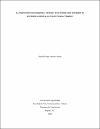La relación entre la escenografía y estructura de la vivienda como articulador de actividades productivas en el barrio Paraíso, Chapinero
Resumen
El presente documento de investigación se enfoca en evidenciar la relación entre la estructura y escenografía de la vivienda en el barrio Paraíso, Chapinero de Bogotá, como un medio para articular las diversas actividades productivas identificadas. En este sentido, la metodología se desarrolla en tres etapas, en la primera etapa se realiza el proceso de identificación, en el cual por medio de las herramientas metodológicas de visitas de campo y encuestas se concluye que las actividades predominantes son el cultivo, reciclaje y recolección de agua en la segunda etapa se busca reconocer por medio de las herramientas de mapping y notación que producen unos resultados al movimiento diario de los habitantes y su realización de actividades identificadas y con esta información analizada se inicia la tercer etapa que se reconoce la importancia de la escenografía y estructura que organiza las viviendas y sus actividades productivas y con ello aplicar esta recolección de información en ejercicios realizados de la metodología como el programa barajado, XYZ y bioclimática. Dando como resultado un diseño de vivienda que por medio de la relación entre escenografía y estructura una vivienda que responda y articule las actividades productivas del barrio el Paraíso.
Abstract
This research document focuses on demonstrating the relationship between the structure and scenery of the house in the Paraíso neighborhood, Chapinero de Bogotá, as a means to articulate the various productive activities identified. In this sense, the methodology is developed in three stages, in the first stage the identification process is carried out, in which through the methodological tools of field visits and surveys it is concluded that the predominant activities are cultivation, recycling and Collection of water in the second stage seeks to recognize through mapping and notation tools that produce results to the daily movement of the inhabitants and their performance of identified activities and with this analyzed information the third stage begins that the importance is recognized of the scenography and structure that organizes the houses and their productive activities and thus apply this information gathering in exercises carried out in the methodology such as the shuffled program, XYZ and bioclimatic. Resulting in a housing design that, through the relationship between scenery and structure, a house that responds to and articulates the productive activities of the El Paraíso neighborhood.
Palabras clave
Keywords
Collections
 This work is licensed under a Creative Commons Reconocimiento-NoComercial 4.0.
This work is licensed under a Creative Commons Reconocimiento-NoComercial 4.0.

